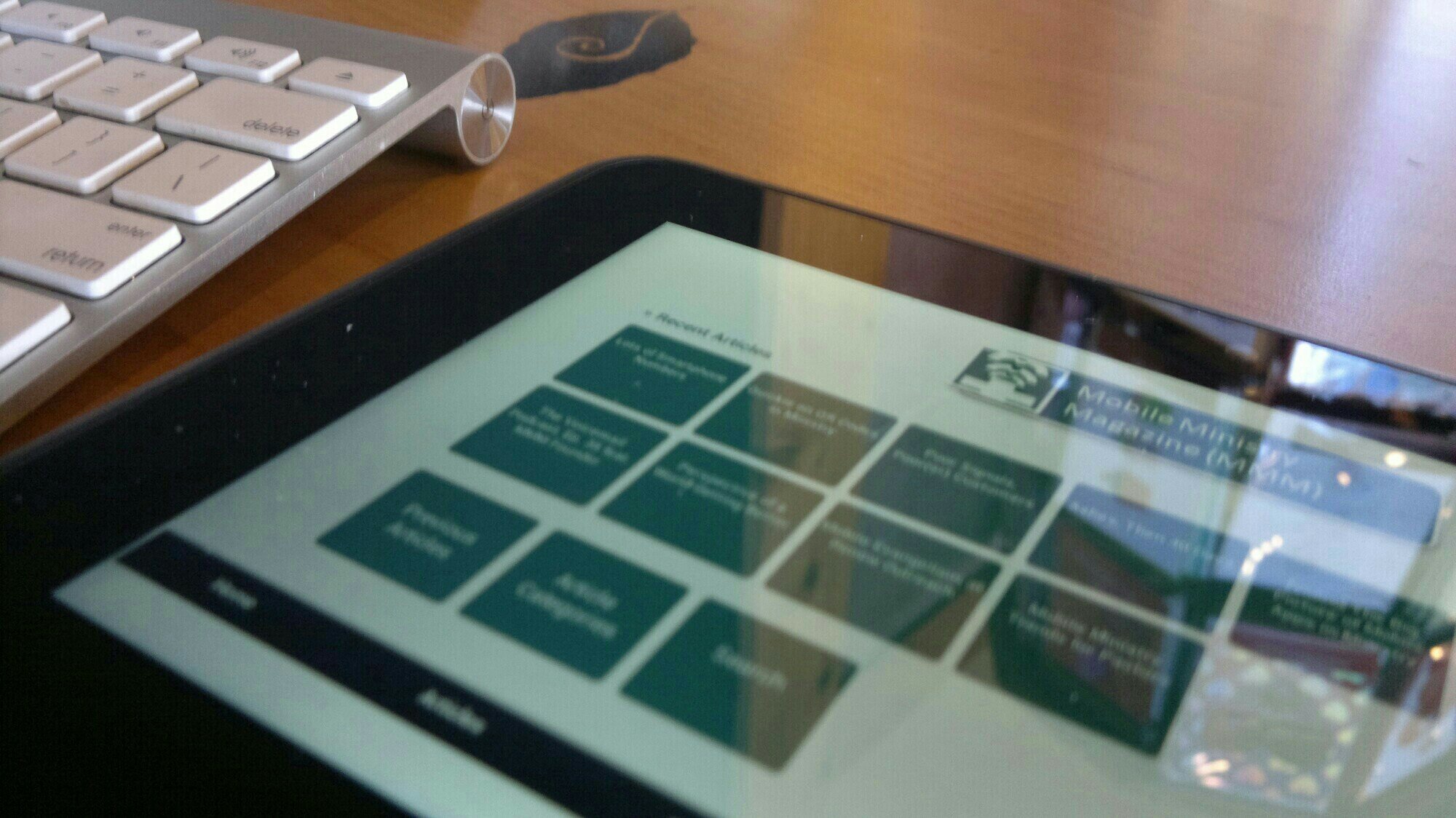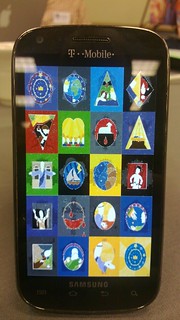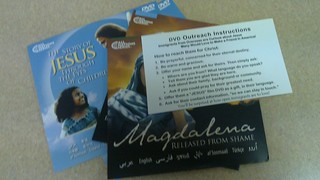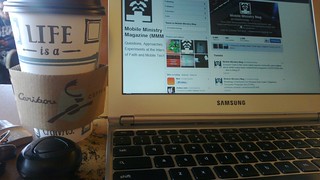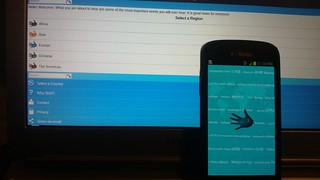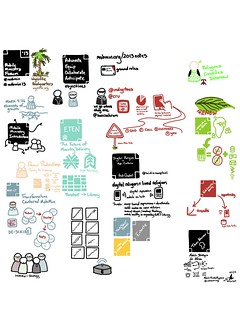The past years have been incredibly hard. Going at it with MMM as a primary effort has been all kinds of hard. I’ve had to move a few times, deal with the good and bad of working on collaborative projects, reject a few speaking gigs (because they wouldn’t pay), and accept a few others not knowing how I’d get there. Suffice to say, there’s a part of me that wishes that it was possible to have kept the pay from the old job while doing this – but I think I might have prayed too long and too hard and didn’t see the wisdom there. Continue reading
Author Archives: Mobile Ministry Magazine
Mobile Ministry 2013 Notables
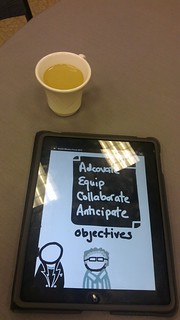
At the end of the calendar year, its customary to have all kinds of lists going about where you summarize important things, or make notes towards what should be coming in the new year. To a degree, we’ll keep with that – we’ve got some resolutions to report on – but I do want to note a few folks who came to mind as having some kind of neat positive and disruptive effect towards moving #mobmin forward this year. We’ll just note them by their Twitter handles:
- @jrgifford
- @tck2g
- @joelsam
- @brettq
- @heidiacampbell
- @renewoutreach
- @indigitous
- @issacharsummit
- @mobmin
Like with the Mobile Ministry Recommendations article, we’ll append this one as we think of a few more.
Mobile Ministry Recommendations
Its now a few days after Christmas, and you might have been blessed to receive a new device, a gift card to an app store or two, or just want to refresh your wares with something different. Here are some #mobmin-tuned recommendations:
Software/Services
Content
- Logos Mobile Ed
- CLA Mobile Ministry Course
- Olive Tree’s Enhanced BIble Study App Resource Guides
- PhonePublish
- Mobile Ministry Made Easy (PDF)
- Audio Bibles: MMM, Mobile Advance
- FeynLabs
Devices/Accessories
- Moto X on Republic Wireless
- Oppo N1 w/Cyanogenmod
- Jolla
- Renew Outreach’s Lightstream
- GSMK Cryptophone 500
I might just come back to this and add a few more items to it as the days continue. These were just a few of the items that have come up over the course of 2013 and been impressive in their respective contexts.
What would you recommend? Make a strong case and we’ll add it here.
Merry Christmas, Is Near
Merry Christmas to you and your families, organizations, and communities.
Even though the 25th falls on a day we’d post something, we just want to leave you with that and an article posted via Medium a few days ago.
[Posted @Medium] Is Near, Is Near https://t.co/aiv165HWnl
— Antoine RJ Wright (@ARJWright) December 23, 2013
Read Is Near, Is Near at Medium
Have a Merry Christmas, and take the time to not just receive gifts, but reconcile to those whom you can – as that might be the gift some have been looking for all along.
Updating Outreach Tools
Over the years, some of the conversations about mobile ministry have started (and sometimes stalled) at the outreach tools ministries and individuals use for their efforts. A common thing I’m seeing now is mobile apps for rich countries and DVDs/SD cards for poorer ones. Its interesting, and somewhat disheartening.
When you get out of the bubble of being immersed in mobile technologies and behaviors, you start to realize that mobile has a long way to go – mainly because there are methods that media organizations are used to, methods that audiences are used to, and a ground that’s transforming beneath them.
Questions asked to media ministries whom are looking at mobile, but already have distribution methods include things like:
- Is the content you currently producing/distributing able to be viewed on mobile devices
- What kinds of mobile devices are being used where you distribute that content
- Can your pre/post-production processes respond to mobile formatting and distribution
- What kinds of metrics does your org, its donors, etc. require
And then there’s just that simple basic thing of culture. Does the content you are bringing to that community already speak towards their culture, or is there some kind of teaching involved to make some of those points translate cleanly? If so, do those outreach tools actually work for outreach, or are they access points towards education (an in-reach activity)?
When someone hands me a DVD or CD today, I as them if they are more interested in getting their message to me than in me being able to use it? I should be asked if DVD/CD is a method that I’m apt to receive for this kind of material (am never asked that). If/when I respond if they have it available to share with me from their mobile and they say no – I have to ask again if they are more concerned with their message than in me receiving it.
When mobile comes into the picture, outreach tools have to not only reflect the intent of the message, but the ears of the audience.
A Few in the Tabs
I’ve got a few pieces sitting in the tabs that I’ve wanted to expound on, but just haven’t made the time to do so. Here are some of those items sitting under that extended contemplation:
…One of the things I love most about technology is the space it allows us to dream and innovate. There’s always an opportunity for something new and people are hungry for it. So, if mobile technology has truly expanded to become a part of our daily life, how can we use this to reach people with the truth of Jesus Christ?
Read the rest of Mobile Technology and the Church at The Issachar Initiative
…Second, I’d like to point you to a great little book called Shaping a Digital World: Faith, Culture and Computer Technology by Derek Shuurman, a computer science professor at Redeemer University College in Canada…
Read the rest of TheoMedia and Other Great, New Books on Technology at Don’t Eat the Fruit
…Vision must be aligned to the company’s mission: What is great about the drones is that they actually make a lot of sense given Amazon’s core business model. As I wrote previously in Amazon’s Dominant Strategy…
Read the rest of Amazon and the Benefits of Vision at Stratechery
…this points to how important research triangulation is to make good decisions based on insights, not just data. Real insights are found at the intersection of different research methods. Not over in the corner with just one method…
Read the rest of Conversions Are Not People at Elezea
In the case of the touchscreen, the spatial and visual meaning is not exactly gone, but is now floating and inflated. The touchscreen has multiple screens—each screen, a unique landscape. The single smooth surface offers itself for multiple landscapes and constantly changing meanings. At one moment, a swipe will unlock the phone; the next, the same swipe will answer an incoming call. Same motion, same locations, different meanings. The touchscreen’s agnosticism permits multiplied meanings.
Read the rest of Unbuttoned: The Meaning of Buttons in a Touchscreen World at The Second Eclectic
…Digicel built its business model around going to small, difficult countries that larger companies would avoid. These countries are challenging environments that “you’d run a mile from” because they don’t seem to have the resources to afford mobile telephony, says Colm Delves, Digicel’s CEO…
These all might read like stars on a cloudy night. But, I’ve had them set because these all speak to various points about mobile ministry which might elevate opportunity, best practice, caution, or surprise. I don’t know what might consist of those items on your reading list, but these are just a few of mine. As you walk though the holiday – and a slower news cycle – perhaps part of what stays open in your tabs provokes your imagination or sense of opportunity.
Does Mobile Finish the Task
Through the recent MMF Consultation, we connected with the group Christ for All Peoples. They are one of very few organizations whose missional impact takes the perspective of reaching out to immigrants, and letting that influence put them in the position to go to various people groups around the world. During our time chatting, one of the pieces of information shared came from the website Finishing the Task which not only impressed the state of the missions movement, but also begs the questions if/when/how mobile can help finish the task.
Unreached People Groups (PDF) from Finishing the Task
Some years ago, we talked about realistically looking at the impacts of mobile. I think this dataset allows for us to revisit that question, and then ask of our methods and activities if we are engaging the technology and behaviors of mobile correctly in order to finish the task. As we stated on the panel at the MMF Consultation – information is not transformation. We cannot make a mountain out of distribution methods, and do nothing about lifestyle. We cannot just put a bible on a device and expect that literacy rates will rise and with that people will engage Christ. There’s something a bit more… detailed about the point of using mobile that our methods in mobile ministry have to speak towards. And when they do, then we see without a doubt that mobile ministry is truly effective.
So, for your organization, what about mobile directly or indirectly finishes the task of getting the Gospel to the ends of the earth?
Security and Comms, Your Mobile Concerns
As I’m sure that if you are reading MMM, you are aware of much of what’s happening in and around the NSA/Snowden topic and its effects. In an article read recently at The Atlantic, something stuck out that made me wonder a bit:
One senior collection manager, speaking on the condition of anonymity but with permission from the NSA, said “we are getting vast volumes” of location data from around the world by tapping into the cables that connect mobile networks globally and that serve U.S. cellphones as well as foreign ones. Additionally, data are often collected from the tens of millions of Americans who travel abroad with their cellphones every year.
I just wonder, and maybe its just me more than things that are already spoken – do folks who work in IT/IS for organizations who do travel and need secure communications understand this? Are they putting together security plans which are easy to follow and clearly lay out why “mobile as normal” isn’t the lingua franca anymore?
In a conversation with the CEO of GSMK Cryptophone some months back, amongst the security topics we talked about, the way that mobile is perceived as an area of concern – or not – for faith-based orgs/NGOs came up in one of the questions, here’s a quote from my notes:
What would be some recommendations that you’d have for religious organization who have a need for secure mobile communications, but aren’t sure where to start?
- think hard about what your threat scenarios are; what are the potential problems
- what areas/people that need to be protected
- think of the entirety of communications
- lots of problems can be solved with open source software
- pay attention to the range of suppliers and the range of solutions out there
- understand that mobile devices might not be usable at all
Are these concerns that you hear in your planning sessions for mobile ministry efforts? Or, do you only think about security, political, or other implications only after they have happened? How do you address mobile concerns, if at all?
Additional Note: After investigating several mobile security solutions, GSMK seemed to have the best overall solution. I was very convinced after conversing with them that not only would it be a tech solution, but a behavioral one. Plus, for those who like those modern devices, their security-hardened version of Android is hard to beat. Check them out for your personal or organizational needs.
Teaching Them to Teach Others
One of the points brought up during the 2013 Mobile Ministry Forum Consultation panel talk I sat on (Church Relevance captured this nicely), was that mobile ministry is most effective when individuals and orgs point their efforts to teaching others how to do what you do (credit, Mobile Advance).
The scene at my house right now – the 4yo explaining to the 2yo twins how to put music on the ipad to dance #kids pic.twitter.com/wTQ68Dg4zd
— Bob Egan (@bobegan) December 14, 2013
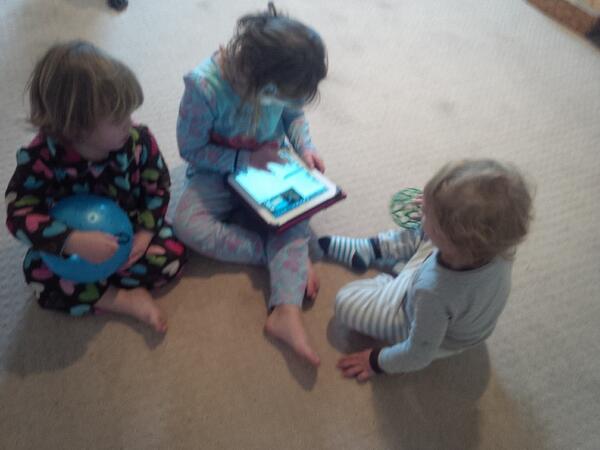
How do you enable others? Do you let moments like this happen?
Reflections on #mobmin13 Conference
Am still working through notes and such from the 2013 Mobile Ministry Forum Consultation, but while doing so, I wanted to jot down a few things which are still sticking out as points of reflection.
- For those who usually follow me, you know that I draw my notes during conferences, workshops, and Bible studies. I did the same here. Here’s the PDF (because you’ll want to zoom in for the really, really small stuff) and here’s the JPG – posted on Twitter and Google+ if you want to share too
- I actually was very surprised to see so much paper used during the conference. And then Clyde Taber pulled out using an Apple TV and his iPhone – from a happy-in-tech moment, that was one of the best (4 years ago, he gave me a blank look when I did stuff like that).
- Pay attention to Heidi Campbell’s work – some good data backing observations said here and other places; her upcoming study on digital religious creatives will be great
- Talked a bit about version 2 of the Mobile Ministry Methodology – even gave a preview of the analytic tool that will be launched alongside it. Guess who has more work to get done. See Version 1 of the Mobile Ministry Methodology
- Distribution using SD Cards is all the rage. Lots of folks wanting pure voice solutions though.
- The range of age was nice to see, and not like it was a few young and a lot of old; there was a lot of everyone (except women – conferences as a whole just need to be better on that end)
- If you get to meet Kent Shaffer – just listen. The Spirit of God rests on him. He was live-blogging the conference too (Preview, Recap 1, Recap 2)
- Each year, someone comes with a heavy bat of stats and info. This year it came twice: Faith Comes By Hearing and Tomi Ahonen – loved it
- Best quotes: “Information is not transformation” (John Edmonston of Cybermissions) and “Recharging and Redemption” (Tomi Ahonen)
- TWR 360, Ekko Mobile, Estante, Lightstream, C2C Story
- There were rumblings from some folks about how to pay more attention to the rise of the church in sub-Saharan Africa and SE Asia – I can imagine that next year, those folks will be represented well.
- I didn’t have the best of attitudes at the beginning of the conference, just kind of didn’t feel like hearing the same things (its been a long time in this space); by the time it ended, I changed – and got some timely and appropriate honesty from a few folks. I’m grateful for those in the Body who still pull us aside and let us know about ourselves.
That’s all for now. I’ll figure out something else in terms of reflections on another time. Check out the #mobmin13 and #mobmin hashtags on Twitter and other social media spaces for reflections from others. Or, go out there and experiment a bit.
